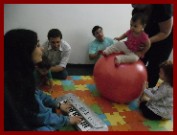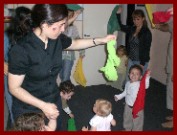suzukipianoschool
Early Musical Encouragement
Inglés > Educative Proposal
The syllabus for Suzuki Early Musical Encouragement offers children the possibility of living music as from an early age, taking it on in a natural and pleasant way such as what happens with the mother tongue.
Through the very dynamic activities, children together with their parents enjoy music, expressing themselves through songs; movement; games; rhymes; exploring different sound sources and sharing with other children a space of enjoyment and enthusiasm.
In contrast to other proposals for Early Musical Encouragement, this syllabus has as pillars the basis of Suzuki´s Philosophy. Therefore, it is very important to take into account that:
· Father/Mother´s participation is essential
· The integral formation of the child will directly depend on his Environment.
· The principle aim of the syllabus is to educate the person through music.
AIMS OF THE SYLLABUS FOR EARLY MUSICAL ENCOURAGEMENT
· To develop the inmense potencial that all child brings at birth, through the adequate musical stimulus.
· To actively engage parents in the process of learning with their children, taking into account that they are their children´s most important and best teachers.
·To strengthen the link father-mother-child through music
· To enrich the child´s integral formation in the emotional, affective, intuitive, intelectual, physical, sensitive, social levels among others.
·To create a musical atmosphere, so that the baby may absorb music in a natural way, the same he does with his mother tongue.
·To secure the class routine gradually, in an optimistic environment free from pressures.
· To propitiate the child´s constant success, through easily reached targets adequate for him.
To offer the child the adequate musical preparation so that he may later play a musical instrument if he wishes .
· To develop in children love for music and taste for beauty and quality
Abilities that children develop during the Syllabus for E.M.E.
· Development of self esteem and confidence in themselves
·Development of memory and concentration
·Gradual development of sensibility and musical intuition
·Development of imagination.
Development of diverse social abilities
·Development of a musical ear and the ability to listen
·Development of the capactity to combine the senses of hearing, touch and sight.
As from the age of 3, many of these Aims and Abilities continue developing, when the child advances in his musical formation through the learning of an instrument.
E.M.E in relationship with the Development of the Multiple Intelligences
Howard Gardner and his team at the Univeristy of Harvard, identified eight different types of intelligence: Logical.Mathematic; Linguistic; Spacial; Musical; Corporal-Kinesthetic; Intrapersonal; Interpersonal; Naturalist.
In our E.M.E. lessons we work developing the child from different aspects, activating the different intelligences.

